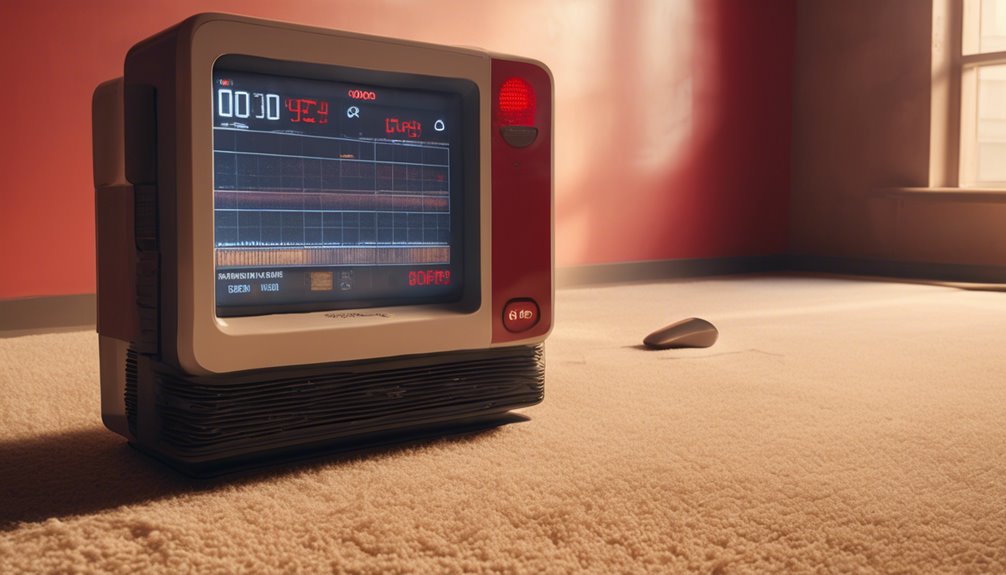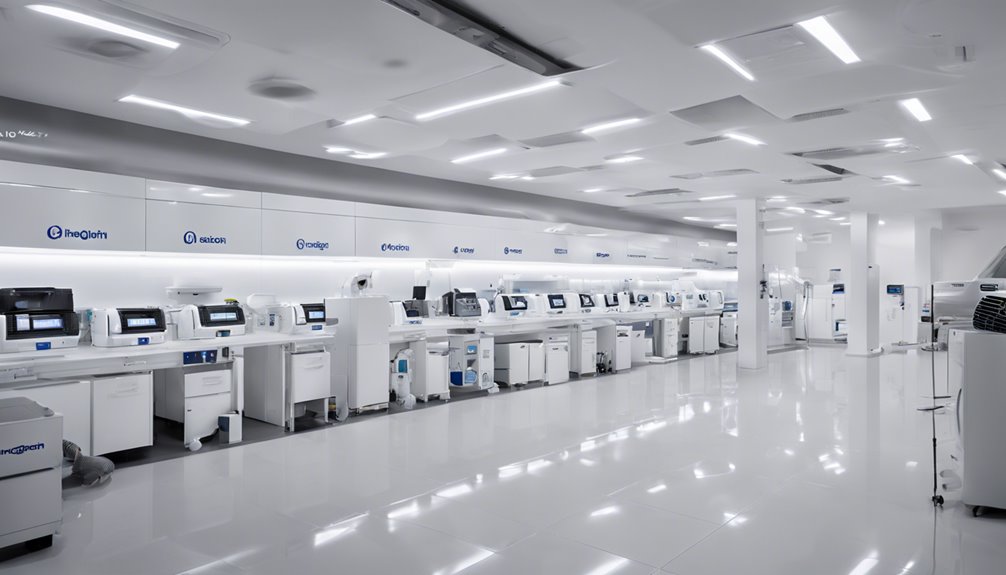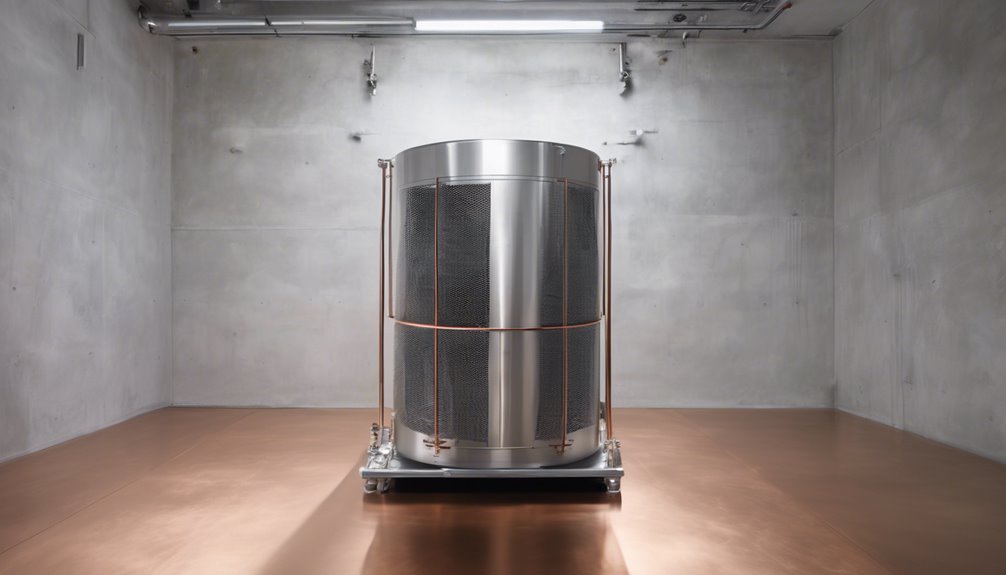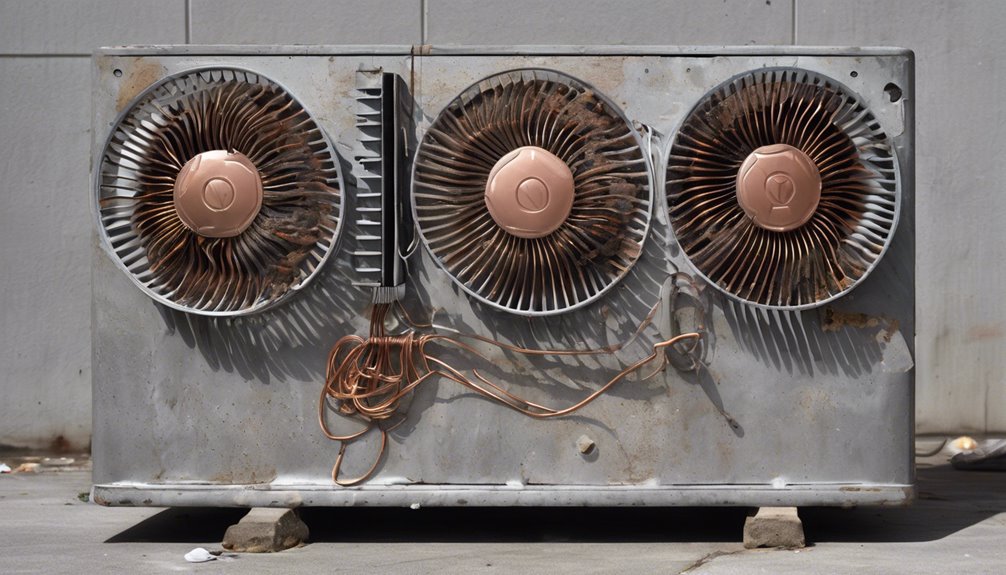When your AC keeps shutting off by itself, it's likely due to an underlying issue that needs attention. It could be a faulty thermostat, power problems, refrigerant leaks, dirty air filters, or electrical connection woes. These common culprits can lead to further damage, increased energy bills, and even safety hazards if left unaddressed. If you're tired of dealing with an AC that turns off unexpectedly, take a closer look at these potential causes to get to the root of the problem and enjoy a cooler, more comfortable home.
Key Takeaways
- A faulty or misconfigured thermostat can cause your AC to turn off unexpectedly, requiring professional diagnosis and repair.
- Power issues like tripped circuits, blown fuses, or voltage fluctuations can shut down your AC, and may need professional attention.
- Refrigerant leaks or low refrigerant levels can disrupt system balance, triggering shutdowns, and require prompt professional inspection and repair.
- Dirty or clogged air filters can restrict airflow, causing your AC to overheat and shut down, and regular replacement is recommended.
- Loose or corroded electrical connections can cause your AC to turn off unexpectedly, and regular checks can help prevent serious problems.
Thermostat Troubles: A Faulty or Misconfigured Thermostat
If your AC keeps turning off, a faulty or misconfigured thermostat could be the culprit.
You might be wondering why your thermostat is causing the issue. Well, it could be due to improper calibration. Check if your thermostat is correctly calibrated to ensure it's sending the right signals to your AC.
Improper thermostat calibration can cause issues, so ensure it's set correctly to send the right signals to your AC.
If calibration doesn't solve the problem, it might be time to consider thermostat replacement. A malfunctioning thermostat can constantly cycle your AC on and off, leading to frequent shutdowns.
Don't hesitate to call a professional if you're unsure about thermostat calibration or replacement. They'll help you diagnose and fix the issue, getting your AC running smoothly again.
Power Issues: Tripped Circuits, Blown Fuses, and More
Your AC keeps turning off, and you're left sweating in the heat. One possible reason is a power issue. If your AC is drawing too much power, it can cause a circuit overload, leading to a tripped circuit or blown fuse. This can happen when you have multiple appliances running simultaneously, overloading the electrical circuit. Electrical surges can also cause your AC to shut down.
| Power Issue | Causes | Solutions |
|---|---|---|
| Tripped Circuit | Overloaded circuit, faulty wiring | Check circuit breaker, reset or replace |
| Blown Fuse | Electrical surge, old or worn-out fuse | Replace fuse with correct amperage rating |
| Voltage Fluctuations | Grid issues, nearby construction | Contact utility company, consider voltage regulator |
Refrigerant Leaks and Low Refrigerant Levels
Now that you've ruled out power issues, it's time to inspect the AC's internal components.
Refrigerant leaks and low refrigerant levels can cause your AC to turn off by itself. When refrigerant leaks occur, it can lead to refrigerant loss, which disrupts the system's balance.
This system imbalance can trigger the AC to shut down as a safety precaution. If you suspect a refrigerant leak, look for signs like hissing sounds, ice buildup, or water leaks around the unit.
It's essential to address refrigerant leaks promptly, as they can cause further damage and increase your energy bills. Have a professional technician inspect and repair any leaks to get your AC running efficiently again.
Air Filter Problems: Dirty, Clogged, or Incorrectly Installed Filters
A dirty air filter can silently sabotage your AC's performance, leading to frequent shutdowns.
You mightn't even realize it's happening, but a clogged filter restricts airflow, causing your AC to work harder and eventually overheat. This can trigger the safety switch, shutting it down to prevent damage.
A clogged filter silently sabotages your AC, causing it to work harder, overheat, and eventually shut down to prevent damage.
Filter neglect is a common culprit, but a dirty installation can also be the problem. If you've recently installed a new filter, double-check that it's properly seated and secured.
Make sure you're replacing your filter regularly, as recommended by the manufacturer. A clean filter ensures your AC runs efficiently and reduces the likelihood of unexpected shutdowns.
Condenser Coil Conundrums: Dirty, Frozen, or Blocked Coils
The condenser coils, located outside, play a crucial role in dissipating heat from your AC's hot refrigerant gas.
If they're dirty, frozen, or blocked, your AC will struggle to cool your home, leading to shutdowns. You mightn't think about cleaning the condenser coils, but it's essential for your AC's performance.
Dirty coils can increase your energy bills and reduce your AC's lifespan. Make condenser maintenance a priority by cleaning the coils regularly.
Use a garden hose to gently remove dirt and debris. If you notice ice buildup, turn off your AC and let it thaw before restarting.
Keep the area around the coils clear of obstructions to ensure proper airflow. By keeping your condenser coils clean and clear, you can prevent shutdowns and keep your AC running smoothly.
Electrical Connection Woes: Loose, Corroded, or Damaged Wires
When you're troubleshooting your AC's shutdown issues, you'll want to inspect the electrical connections for any loose wire connections that might be causing the problem.
Corrosion and rust can also weaken the connections, leading to shutdowns, so make sure to check for any signs of wear. Additionally, damaged insulation on the wires can expose the conductors, causing shorts and shutdowns, so be sure to examine the wires closely.
Loose Wire Connections
You're probably no stranger to the frustration of dealing with electrical connection woes, and loose wire connections are one of the most common culprits.
When wires aren't securely fastened, it can cause your AC to turn off unexpectedly. Check for loose connections at the compressor, fan motor, and capacitor. If you find any, tighten them firmly.
Be cautious not to overtighten, as this can cause wire damage or connection faults. Also, inspect the wires for signs of wear or damage. If you notice any cracks, frays, or exposed copper, replace the wires immediately.
Corrosion and Rust
Corrosion and rust can sneak up on your AC's electrical connections, causing them to fail without warning.
If you live in coastal climates or humid environments, you're more prone to these issues. Moisture in the air can seep into your AC's connections, leading to corrosion and rust.
Some signs of corrosion and rust include:
- Visible rust or corrosion on wires or connections
- Water spots or mineral buildup on electrical components
- Intermittent AC shutdowns or erratic behavior
- Burning smells or sparks near electrical connections
Check your AC's electrical connections regularly to catch corrosion and rust before they cause serious problems.
Damaged Insulation
Damaged insulation around your AC's electrical connections can lead to a world of trouble.
It's a common issue that can cause your AC to turn off unexpectedly. Insulation gaps or worn insulation can expose wires, leading to electrical shorts or overheating.
When this happens, your AC's safety features kick in, shutting it down to prevent damage or a fire. Check your AC's electrical connections for signs of damage, such as frayed or cracked insulation.
If you find any issues, it's essential to address them promptly. Replace worn or damaged insulation to ensure a safe and reliable connection.
Sensor Snafus: Faulty or Dirty Temperature Sensors
Faulty or dirty temperature sensors can be the culprit behind your AC's frequent shutdowns.
These sensors play a crucial role in regulating your AC's performance, and when they're not functioning correctly, your AC may turn off unexpectedly.
You might be wondering what's causing the issue.
- You're stuck in a never-ending cycle of AC repairs, wasting your hard-earned money.
- You're left sweating in the summer heat, feeling frustrated and helpless.
- Your AC's sensor drift is causing it to misread the temperature, leading to premature shutdowns.
- You're worried that ignoring the issue will lead to further damage, resulting in a costly replacement.
Check your sensor calibration to ensure it's accurate.
Clean or replace the sensors if necessary, and see if that resolves the issue.
Frequently Asked Questions
Can I Prevent My AC From Turning off by Itself?
You can prevent your AC from turning off by itself by disabling power saving features or adjusting the auto restart function, ensuring your unit runs continuously without interruptions, and enjoying a consistently cool and comfortable environment.
Will a Smart Thermostat Fix the Issue?
You're wondering if a smart thermostat will solve the issue. It likely will, as smart features like auto-scheduling and geofencing can optimize energy efficiency, ensuring your AC runs smoothly and efficiently, reducing unexpected shutdowns.
How Often Should I Clean My Ac's Condenser Coils?
You should clean your AC's condenser coils at least twice a year, during seasonal transitions, to ensure optimal performance. Regular coil maintenance through seasonal cleaning helps prevent dust and debris buildup, reducing energy consumption and prolonging your AC's lifespan.
Can a Dirty Evaporator Coil Cause the AC to Shut Off?
You're right to suspect the evaporator coil; a dirty one can indeed cause your AC to shut off. During coil inspection, look for blockages, and remember to perform regular filter maintenance to prevent this issue and ensure smooth operation.
Will a Faulty Capacitor Cause My AC to Turn off Randomly?
You're wondering if a faulty capacitor is the culprit behind your AC's random shutdowns. Yes, it's possible! A faulty capacitor can cause your AC to turn off randomly. Consider capacitor testing or even capacitor replacement to resolve the issue.
Conclusion
You've identified the possible culprits behind your AC's mysterious shut-downs. Now it's time to take action! Check your thermostat, power supply, refrigerant levels, air filters, condenser coils, electrical connections, and temperature sensors to pinpoint the issue. Make the necessary repairs or adjustments to get your AC up and running smoothly again. Don't let the heat get the best of you – get to the bottom of this problem and enjoy a cool, comfortable home once more.



